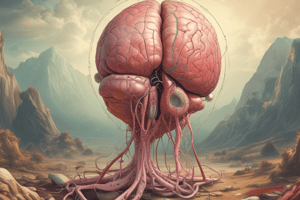Podcast
Questions and Answers
Which part of the adrenal gland is responsible for producing glucocorticoids?
Which part of the adrenal gland is responsible for producing glucocorticoids?
- Renal cortex
- Adrenal medulla
- Renal medulla
- Adrenal cortex (correct)
What is the primary function of mineralocorticoids?
What is the primary function of mineralocorticoids?
- Prepare the body for 'fight or flight' response
- Regulate glucose metabolism
- Regulate electrolyte balance and blood pressure (correct)
- Regulate emotional responses and movement
Which hormone is not produced by the adrenal medulla?
Which hormone is not produced by the adrenal medulla?
- Norepinephrine
- Epinephrine
- Aldosterone (correct)
- Dopamine
Which disorder is characterized by excess cortisol?
Which disorder is characterized by excess cortisol?
Norepinephrine primarily affects which bodily functions?
Norepinephrine primarily affects which bodily functions?
What are the main categories of hormones produced by the adrenal cortex?
What are the main categories of hormones produced by the adrenal cortex?
Flashcards are hidden until you start studying
Study Notes
Adrenal Gland
Location and Structure
- Located on top of the kidneys
- Two adrenal glands, one on each kidney
- Consists of two parts: adrenal cortex and adrenal medulla
Adrenal Cortex
- Outer layer of the adrenal gland
- Produces three types of hormones:
- Glucocorticoids (e.g., cortisol)
- Regulate glucose metabolism and response to stress
- Mineralocorticoids (e.g., aldosterone)
- Regulate electrolyte balance and blood pressure
- Androgens (e.g., androstenedione)
- Regulate male characteristics and reproductive functions
- Glucocorticoids (e.g., cortisol)
Adrenal Medulla
- Inner layer of the adrenal gland
- Produces catecholamines:
- Epinephrine (adrenaline)
- Prepares the body for "fight or flight" response
- Norepinephrine (noradrenaline)
- Increases heart rate and blood pressure
- Dopamine
- Regulates emotional responses and movement
- Epinephrine (adrenaline)
Functions
- Regulates stress response
- Maintains electrolyte balance and blood pressure
- Regulates glucose metabolism
- Supports reproductive functions
Clinical Significance
- Disorders of the adrenal gland can lead to:
- Cushing's syndrome (excess cortisol)
- Addison's disease (adrenal insufficiency)
- Pheochromocytoma (tumor of the adrenal medulla)
Adrenal Gland
Location and Structure
- Located on top of the kidneys, one on each kidney
- Composed of two parts: adrenal cortex and adrenal medulla
Adrenal Cortex
- Outer layer of the adrenal gland
- Produces three types of hormones: glucocorticoids, mineralocorticoids, and androgens
- Glucocorticoids regulate glucose metabolism and response to stress
- Mineralocorticoids regulate electrolyte balance and blood pressure
- Androgens regulate male characteristics and reproductive functions
Adrenal Cortex Hormones
- Glucocorticoids:
- Cortisol regulates glucose metabolism and response to stress
- Mineralocorticoids:
- Aldosterone regulates electrolyte balance and blood pressure
- Androgens:
- Androstenedione regulates male characteristics and reproductive functions
Adrenal Medulla
- Inner layer of the adrenal gland
- Produces catecholamines: epinephrine, norepinephrine, and dopamine
- Epinephrine prepares the body for "fight or flight" response
- Norepinephrine increases heart rate and blood pressure
- Dopamine regulates emotional responses and movement
Functions
- Regulates stress response
- Maintains electrolyte balance and blood pressure
- Regulates glucose metabolism
- Supports reproductive functions
Clinical Significance
- Cushing's syndrome: excess cortisol production
- Addison's disease: adrenal insufficiency
- Pheochromocytoma: tumor of the adrenal medulla
Studying That Suits You
Use AI to generate personalized quizzes and flashcards to suit your learning preferences.



